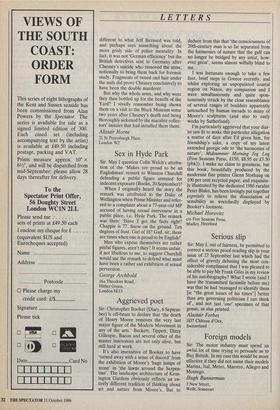Aggrieved poet
Sir: Christopher Booker (Diary, 6 Septem- ber) is off-beam to declare that 'the death of Henry Moore removes the very last major figure of the Modern Movement in any of the arts.' Beckett, Tippett, Dizzy Gillespie, Bacon and several other of the master innovators are not only alive, but still hard at work.
It's also insensitive of Booker to have `turned away with a sense of discord' from the exhibition of Moore's 'huge lumps of stone' in 'the lawns around the Serpen- tine'. The landscape architecture of Kens- ington Gardens obviously reflects an en- tirely different tradition of thinking about art and nature from Moore's. But to deduce from this that 'the consciousness of 20th-century man is so far separated from the harmonies of nature that the gulf can no longer be bridged by any artist, how- ever great', seems almost wilfully blind to me.
I was fortunate enough to take a few first, brief steps in Greece recently, and whilst exploring an unpopulated coastal region on Naxos, my companion and I were simultaneously and quite spon- taneously struck by the close resemblance of several ranges of boulders apparently untouched by human inroads to many of Moore's sculptures (and also to early works by Sutherland).
I'm particularly aggrieved that your diar- ist saw fit to make this particular allegation a matter of days after I'd given him, for friendship's sake, a copy of my latest extended georgic ode to 'the harmonies of nature', Midsummer Morning Jog Log (Five Seasons Press, £150, £8.95 or £3.50 (pbk)). I make no claim to greatness, but this book, beautifully produced by the modernist fine printer Glenn Storhaug on 100 per cent recycled paper, and exquisite- ly illustrated by the dedicated 1986 ruralist Peter Blake, has been lovingly put together expressly to relieve the dissociation of sensibility so wretchedly displayed by Booker's footnote.
Michael Horovitz
do Five Seasons Press, Madley, Hereford


























































 Previous page
Previous page